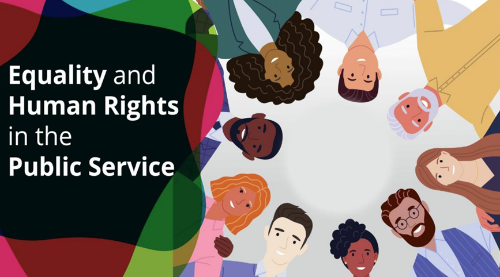In This Section
- Home
- About the EDI Unit
- News & Events
- Publications
- EDI Training Hub
- UCC Equality, Diversity and Inclusion Framework and Action Plan 2025-2028
- Governance and Oversight Committees
- Public Sector Duty
- Athena Swan
- Accenture's Women on Walls
- Speak Out
- Gender Identity and Expression
- Funded Projects
- Staff Networks
- ESVH Hub
- University of Sanctuary
- EDI Data
Public Sector Equality and Human Rights Duty
In 2014, the Irish Human Rights and Equality Commission Act amalgamated the Irish Human Rights Authority and the Equality Commission to create the Irish Human Rights and Equality Commission or the IHREC. Section 42 of this Act sets out the Public Sector Equality and Human Rights Duty, better known as the Public Sector Duty or PSD.
Section 42 of the Irish Human Rights and Equality Commission (IHREC) Act 2014 sets out the Public Sector Equality and Human Rights Duty (also known as The Duty or the Public Sector Duty, or PSD). It requires a public sector body to, in the performance of its functions, to have regard to the need to (A) eliminate discrimination, (b) promote equality of opportunity and treatment of its staff and the persons to whom it provides its services and (c) protect the human rights of its members, staff and the persons to whom it provides its services. To achieve this, the Irish Human Rights and Equality Commission (known as the IHREC) set out the following steps:
- Assess - Carry out an assessment of equality and human rights issues, relevant to the functions of the public body.
- Address- Identify the actions/policies/plans the public body propose to take to address the equality and human rights issues identify during the assess step.
- Report – Report on progress made under the Assess and Address steps in your organisation’s annual report in a manner that is accessible to the public.
To this end, in 2017-18 UCC took part in the pilot scheme for the implementation of this duty. Videos on this pilot scheme as well as other guides and resources from the IHREC in how best to approach implementation of the duty are linked in the text above.
All public bodies in Ireland have responsibility to promote equality, prevent discrimination and protect the human rights of their employees, customers, service users and everyone affected by their policies and plans. This is a legal obligation, called the Public Sector Equality and Human Rights Duty (Section 42 of the Irish Human Rights and Equality Act 2014.)
It contains two distinct but interrelated specific statutory obligations (duties) –Section 42 (1) and Section 42 (2).
Section 42 (1)
Requires public bodies to integrate human rights and equality issues into every aspect of how public bodies performs their functions on an ongoing basis.
Section 42 (2)
Requires public bodies to assess relevant human rights and equality issues, set out policies, plans and actions to address in its strategic/corporate plan. Then to report on developments in relation to addressing equality and human rights issues identified in its annual report.
The two duties place different but interrelated obligations on public bodies as compliance with the obligations under section 42(2) may assist in ensuring compliance with section 42(1).
The Irish Human Rights and Equality Commission ask that all public bodies follow the three steps to completion of this duty: Assess - Address - Report. See how UCC is complying with this below.
To learn more about how to implement the duty. see the IHREC's e-learning tool here.
Implementing the PSD (ISL Version)
Delivering Equality in Public Services Online Training
This free online, e-learning programme will provide you with an introduction to equality in service delivery. It is designed for all public sector staff, across all grades and functions. The whole module takes approximately three hours to complete.
There are three units in the eLearning module:
- Unit 1: Equality in the Public Service – This unit will introduce you to equality and the equality obligations of public bodies as well as supporting your exploration of equality issues facing staff and service users.
- Unit 2: Human Rights in the Public Service – This unit will introduce you to human rights concepts and human rights obligations of public bodies and support your exploration of issues facing staff and service users.
- Unit 3: The Public Sector Equality and Human Rights Duty – This unit will introduce you to the Public Sector Equality and Human Rights Duty and the steps involved in its implementation.

